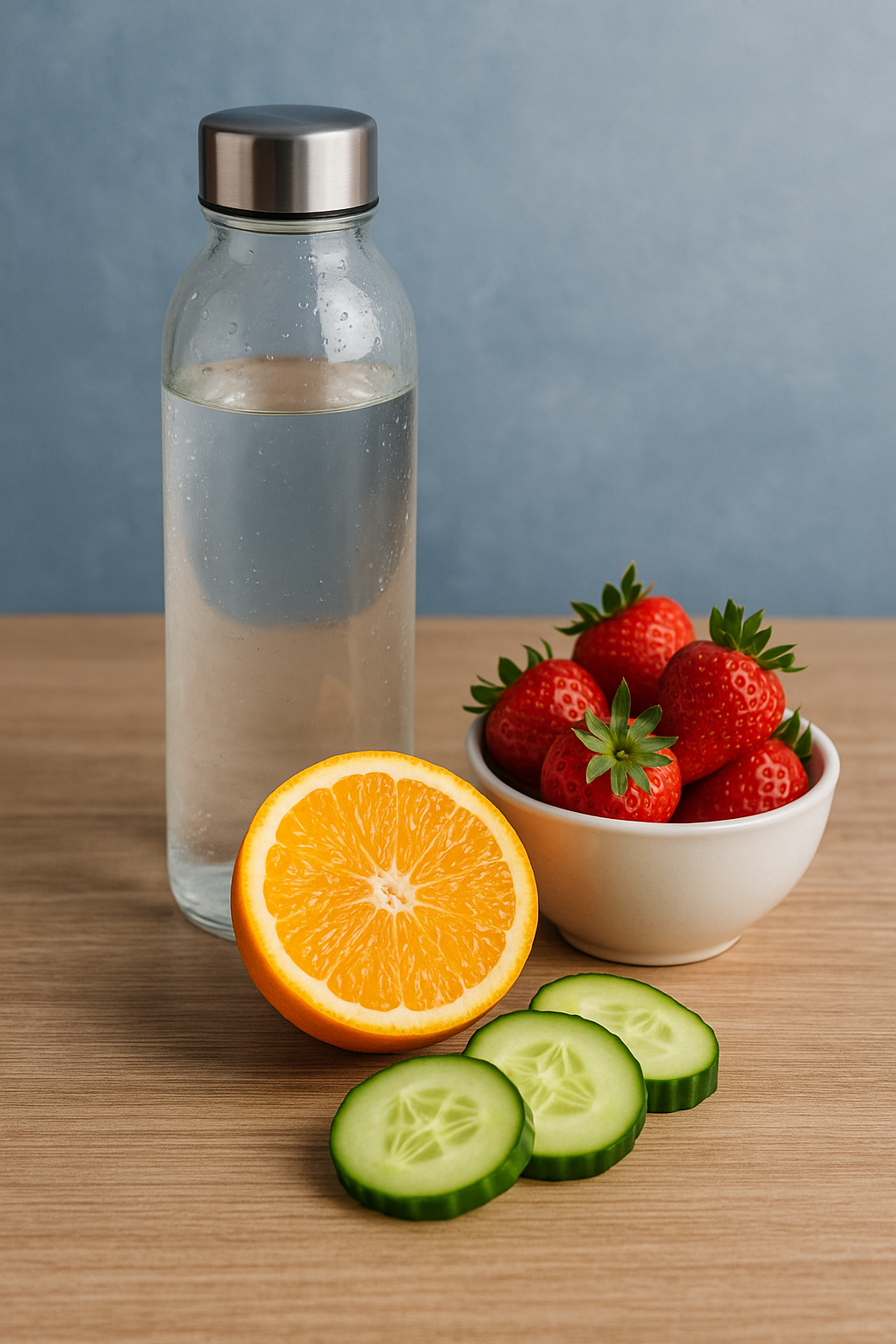Introduction: Hydration — The Forgotten Key to Energy and Vitality
When people feel tired, sluggish, or mentally foggy, their first thought is often to grab coffee, take supplements, or push through the fatigue. Rarely do they consider one of the simplest, most effective solutions: hydration.
Water is essential for every cell, tissue, and organ in the human body. It helps regulate temperature, lubricate joints, transport nutrients, and remove waste. Yet, despite its importance, many people live in a constant state of mild dehydration without realizing it—leading to decreased energy, reduced mental clarity, and even mood swings.
In this comprehensive guide, we’ll explore how hydration impacts physical and mental performance, how much water you really need, the signs of dehydration, and step-by-step strategies to stay hydrated effortlessly.
Why Hydration Matters for Energy and Health
Water and Your Body’s Core Functions
Your body is about 60% water, but that water isn’t static—it’s constantly used for essential processes:
- Delivering nutrients and oxygen to cells
- Supporting digestion and nutrient absorption
- Regulating body temperature through sweating and respiration
- Cushioning and protecting vital organs and joints
- Removing waste via urine and sweat
Even mild dehydration can make these systems work less efficiently, leaving you feeling fatigued and unfocused.
Hydration and Brain Function
The brain is especially sensitive to fluid balance. Comprising about 75% water, it depends on adequate hydration for optimal performance.
Research Insight:
Studies have shown that losing just 1–2% of body water can impair short-term memory, reduce attention span, and increase feelings of anxiety and irritability.
Hydration and Physical Performance
Athletes and active individuals feel the effects of dehydration more quickly. Losing as little as 1% of body weight in fluids can:
- Decrease endurance
- Reduce strength
- Delay reaction times
- Slow recovery after exercise
For anyone engaging in moderate to intense activity—especially in hot environments—hydration is a direct performance factor.
How Much Water Do You Really Need?
The “8 glasses a day” rule is a good starting point, but your needs depend on factors like age, body size, activity level, and climate.
Guidelines from the U.S. National Academies of Sciences:
- Women: ~2.7 liters (91 ounces) of total fluids daily
- Men: ~3.7 liters (125 ounces) of total fluids daily
This total includes water from drinks and food. Fruits and vegetables can contribute significantly—some are over 90% water.
Signs You Might Be Dehydrated
Mild dehydration can be subtle, so watch for these signs:
- Dark urine (pale yellow is ideal)
- Persistent fatigue
- Headaches
- Dizziness or lightheadedness
- Dry mouth and lips
- Reduced concentration or “brain fog”
Tip: If you rarely feel thirsty, it doesn’t always mean you’re hydrated. Many people have a delayed thirst response, so proactive sipping is key.
Best Sources of Hydration
1. Water
Still the most efficient and healthiest option—zero calories, zero sugar, and readily available.
2. Water-Rich Foods
Fruits like watermelon, strawberries, oranges, and cantaloupe, plus vegetables like cucumbers, lettuce, zucchini, and celery, are excellent sources.
3. Herbal Teas
Caffeine-free herbal infusions like chamomile, peppermint, or rooibos hydrate while offering flavor variety.
4. Electrolyte Drinks
Useful for athletes or during prolonged sweating. Choose low-sugar options to avoid unnecessary calories.
5. Broths and Soups
Especially beneficial in colder weather for hydration and mineral replenishment.
Tips to Stay Hydrated Throughout the Day
1. Start Your Morning with Water
After 7–8 hours of sleep, your body is naturally dehydrated. Drink a glass first thing to kickstart hydration.
2. Carry a Reusable Bottle
A visible, refillable bottle is a constant reminder to sip regularly.
3. Flavor Naturally
Add slices of lemon, cucumber, berries, or herbs like mint to make water more appealing without added sugar.
4. Use the 20-Minute Sip Rule
Take a sip every 15–20 minutes during waking hours to maintain steady hydration.
5. Track Intake
Use phone reminders or hydration apps to ensure you’re meeting daily goals.
6. Adjust for Activity
Increase intake before, during, and after exercise or outdoor activity in heat.
Hydration and Diet: What Helps and What Hurts
Foods and Drinks That Support Hydration
- Leafy greens, tomatoes, and bell peppers
- Melons, grapes, and citrus fruits
- Soups and smoothies made with water-rich ingredients
Things That Can Increase Dehydration
- High caffeine intake (more than 400 mg daily)
- Alcohol (acts as a diuretic)
- Very salty snacks or processed foods
Hydration for Different Lifestyles
Office Workers
- Keep a water bottle at your desk.
- Stand up for a sip every hour—it also helps with circulation.
Athletes
- Drink 500 ml (17 oz) of water 2–3 hours before training.
- Sip every 15–20 minutes during exercise.
- Rehydrate with water and electrolytes afterward.
Hot Climate Residents
- Increase daily intake by 0.5–1 liter.
- Wear light clothing to reduce sweat loss.
Hydration Myths Debunked
Myth 1: Only plain water hydrates you.
Truth: Most beverages and water-rich foods contribute to hydration.
Myth 2: If you’re thirsty, you’re already dangerously dehydrated.
Truth: Thirst is a late signal but not always severe—however, drinking before thirst is best.
Myth 3: Drinking too much water is harmless.
Truth: Overhydration (hyponatremia) is rare but possible, especially during endurance events without electrolyte replacement.
Sample Daily Hydration Plan
Morning:
- 1 glass (250 ml) water upon waking
- Herbal tea or diluted fruit-infused water with breakfast
Mid-Morning:
- 2 glasses water
- Snack on watermelon or cucumber slices
Afternoon:
- 1 glass water before lunch
- 2 glasses water after lunch
- Herbal tea or broth in late afternoon
Evening:
- 1 glass water with dinner
- Herbal tea before bed (avoid caffeine)
Practical Tools to Support Hydration
- Marked water bottles with time goals printed on them
- Hydration reminder apps
- Reusable stainless steel or BPA-free bottles to avoid microplastics
- Electrolyte powder packets for hot days or workouts
Final Thoughts: Hydration as a Daily Energy Habit
Staying hydrated is one of the simplest health habits with the biggest payoff. It costs almost nothing, requires no special equipment, and benefits every system in your body.
By making hydration automatic—integrating it into your daily routine—you’ll notice better mood, sharper focus, and more consistent energy throughout the day.
Your body is constantly losing fluids, so think of hydration not as an occasional fix, but as a steady supply of fuel for your cells, brain, and muscles. Drink smarter, and your body will reward you with vitality and resilience.

